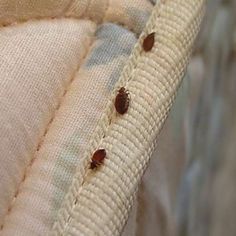Check Out the Different Kinds Of Insect and Their Treatment Options for Effective Management
The management of pests in both property and farming setups demands a detailed understanding of the various kinds that can invade these environments, as well as the therapy choices readily available for effective control. From house rodents that pose health risks to garden insects that endanger plant yields, each category demands a tailored method. Recognizing the subtleties of parasite habits and the matching solutions is crucial; however, the concern stays: what are one of the most effective techniques that not only attend to existing infestations however additionally avoid future occurrences?

Usual Home Vermin
Although family bugs can vary substantially in kind and actions, numerous share usual qualities that make them a problem. Common household pests consist of rodents such as mice and rats, insects like cockroaches and ants, and periodic intruders such as crawlers and flies. These bugs usually grow in environments that offer easy accessibility to food, water, and sanctuary, making homes particularly at risk.
Rats, for instance, are well-known for causing architectural damages and spreading condition. Insects like roaches are not just disturbing but can also cause allergies and asthma in sensitive individuals.
Efficient insect administration begins with prevention, which includes securing entry factors, preserving cleanliness, and using ideal storage space methods for food. Understanding the habits and qualities of these common family parasites is crucial for efficient management and maintaining a healthy living environment.
Yard Bugs and Their Influence
Garden insects posture a considerable threat to the wellness and productivity of plants, with some price quotes suggesting that they can cause approximately 40% of crop losses in particular regions. These parasites, which consist of insects such as beetles, caterpillars, and aphids, along with nematodes, can inflict severe damages by preying on plant cells, leading to stunted development, lowered yields, and jeopardized top quality.
The effect of garden pests prolongs beyond mere visual problems; they can interfere with ecosystems by altering food chains, influencing pollinators, and spreading out diseases among plants. For circumstances, bugs like the crawler mite can compromise plants, making them more at risk to fungal infections. Intrusive varieties might outcompete native plants, leading to biodiversity loss.
Integrated Bug Monitoring (IPM) practices, which integrate biological control, cultural techniques, and targeted chemical applications, can provide sustainable solutions. By comprehending the particular bugs and their actions, garden enthusiasts can apply targeted therapies that not just safeguard their plants yet also advertise a much healthier yard ecological community.
Rats: Identification and Threats
Rodents are usual garden bugs that can pose substantial risks to plant health and overall environment stability. These small mammals, consisting of types such as mice, rats, and voles, are typically recognized by their sharp incisor teeth and durable bodies. Their hair coloration differs extensively, ranging from grey to brown, and they generally show a long tail which aids in balance and dexterity.
The threats associated with rodent problems are complex. Rats are notorious for their function as vectors of different conditions, including hantavirus and leptospirosis, which can be sent to family pets and people.
Furthermore, rats can interrupt the all-natural balance index of local environments by taking on native wild animals for sources. Their burrowing practices can result in dirt disintegration and destabilization of plant origins. Very early recognition and understanding of rodent habits and threats are crucial for effective insect administration.
Reliable Therapy Methods
When handling rodent problems, employing reliable therapy techniques is essential for reducing damages and health and wellness dangers. A multi-faceted technique typically yields the finest results. Catches are an important part of rodent control. Break catches and electronic catches offer a humane and quick means to eliminate rats, while adhesive catches can assist keep track of activity degrees.
Secondly, lure stations including rodenticides can be purposefully put in areas of high rodent task. These terminals should be tamper-resistant to make sure the safety of non-target animals and children. It is critical to select the appropriate bait kind, as rats can create lure hostility if not transformed occasionally.
Along with traps and lure, sealing access factors can substantially reduce the possibilities of re-infestation. This entails evaluating and fixing voids in walls, doors, and home windows.
Last but not least, professional pest control solutions can be helpful for extensive problems. They have the knowledge, tools, and products essential for reliable removal and can establish a tailored monitoring strategy. By carrying out these therapy techniques, homeowner can successfully deal with rodent issues and safeguard their health and wellness and home.
Preventative Procedures and Tips

Preserving cleanliness is similarly critical; make sure that food is kept in closed containers and promptly clean up crumbs or spills. Consistently throwing away trash and making sure that compost stacks are handled properly can prevent parasites from being attracted to your home.
Furthermore, take into consideration landscape design techniques that dissuade rodent habitation. Cut back plant life and keep mulch away the original source from the foundation of your property, as these can offer concealing places for parasites.
Conclusion
Reliable bug management necessitates a comprehensive understanding of numerous bug types and their specific therapy options. Ultimately, an aggressive stance on pest monitoring promotes a much healthier atmosphere, protecting both agricultural and household areas from pest-related obstacles.
Usual home parasites consist of rodents such as rats and computer mice, bugs like cockroaches and ants, and periodic invaders such as crawlers and flies.Rodents are usual yard bugs that can pose substantial dangers to plant wellness and general ecological community security. Very early identification and understanding of rodent actions and dangers are essential for reliable parasite administration.
Reliable insect monitoring begins long before an invasion occurs, with positive actions that can dramatically reduce the chance of rodent entry and habitation.Effective parasite management requires a thorough understanding of various insect kinds and their specific therapy alternatives.